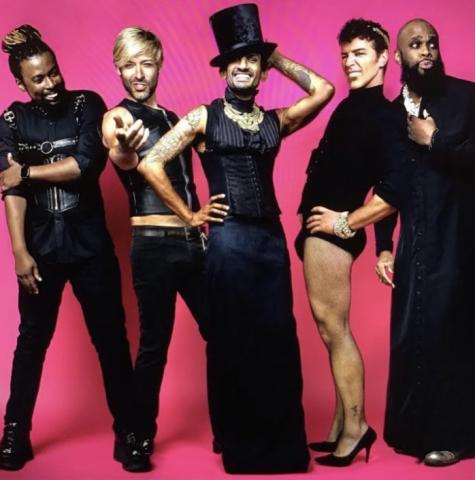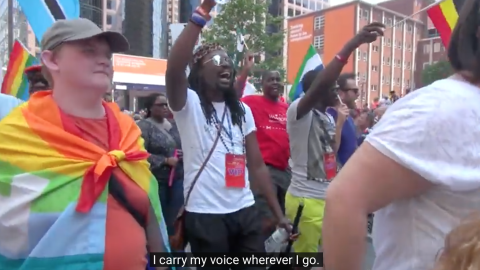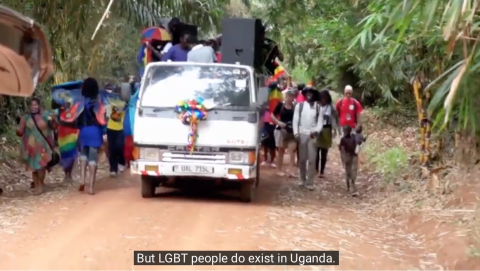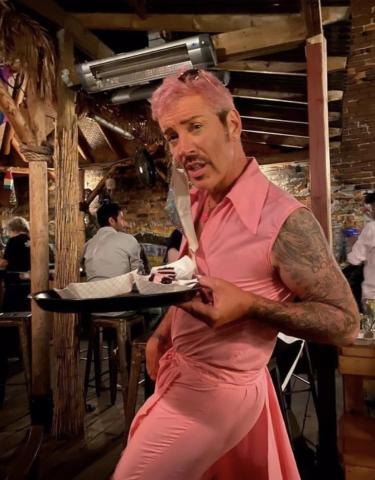
“Once we verify your case, we will try to work with you to develop a solution to make your life safer,” it states on the “request help” page. “We attempt to offer emergency travel support when possible but we also have a number of other programs that focus on financial aid, applications for government sponsorship, in-country relocation or referrals to others who may be able to help. It is essential that you take steps to develop your own solutions while we work together.”
A portion of the proceeds from the Toronto quintet's debut album, Pinky Swear, will aid the global not-for-profit that, according to stats on its web site, has helped more than 1600 individuals “find safety through emergency relocation and other forms of assistance.”
MANifesto founder R. Kelly Clipperton (formerly of Kelly and the Kellygirls and Merkury Burn) assembled the diverse group of fellow gay men with “the right voices and energies” to fulfill his vision. Joining him, just as Kelly, are the also mononymous Brayo, Dionisio, Icarus, and Twaine.
Brayo, whose real name is Nkoyooyo Brian, a.k.a. Brayo Bryans, is from Kampala, Uganda, where he was an outspoken advocate for the LGBT community and director of sexual health and rights non-profit Icebreakers Uganda. He wrote and released a song in 2013 called “The Kuchu Anthem,” — ‘kuchu’ means queer — the same year the Uganda government criminalized homosexuality by passing the Anti-Homosexuality Bill (the original version imposed the death penalty but was amended to life in prison), which was struck down in the summer of 2014.
On Brayo’s web site he asks for support for Rainbow Railroad, and writes, “I don’t want to think about what may have happened to me had I not been able to make a choice to regroup in Toronto. The assistance of Rainbow Railroad helped me live my life on my own terms.”

“I had an idea of writing a proud song called ‘Kuchu Anthem.’ Kuchu is a code word for LGBT. We decided to own it. When you uproot your whole life and move to another country, the question that goes behind your head is ‘How am I leaving my people?’ But even here [Canada], my voice is still moving on and it's still being heard.”
As founder of MANifesto, Kelly talked to Samaritan about Rainbow Railroad and why it was important to use the release of their first album to spread the word, especially having a member who was brought to Canada with theit help.
How do you plan to integrate Rainbow Railroad into your goals for MANifesto?
I've known Kimahli [Powell] for a long time. I knew him when he was a DJ through [queer theatre company] Buddies in Bad Times. And when he became the executive director of Rainbow Railroad, I started to follow more of his initiatives. That was before I even met Brian, who is in MANifesto, who Rainbow Railroad saved his life, ostensibly by getting him to Canada a few years ago. But even before knowing him, I was aware of what the organization was doing.
I find that as like as a gay man of a certain generation, a certainly age, I have so many people to be thankful for, for the chances that they took and the courage that they showed in their life for me to have the life that I've got. In saying that, I realize that sometimes the things that I feel that we're still fighting for and bringing awareness to here in Canada are so trite compared to so many countries where your rights, in general, as a human are minuscule.
So to see what Rainbow Railroad was doing, trying to give people who are gay, lesbian, trans identified, an escape route, basically because their lives are being threatened in the country that they're in just for being themselves, it brings me to tears pretty easily too to hear those experiences. It was definitely a no-brainer in coming up with somebody who we wanted to be part of the MANifesto experience, and all of us being gay men of a certain age, and Bri being from Uganda.

Dionisio, who's another member of the band met him shortly after he arrived here in Canada and worked with him in various other musical environments. So knew a little bit more about Bri’s backstory when he jumped into MANifesto at the top of this year.
One of the very first rehearsals we had, we knew that he had a lot that he wanted to share with us, and we just graciously gave him the platform and tried to make him feel as at home as he could, to be able to share that with us whenever he felt like it. He was very forthcoming very early on. He’s an advocate for queer rights in Uganda and was for his whole life. and that was what started to get the attention that was starting to threaten his life. He was very vocal and very in your face and pushing back against the government and its restrictive behavior and hateful behavior and corrupt behavior.
Ultimately, he mentioned that there was a Pride festival of sorts that brought Rainbow Railroad’s attention to him. That was how he first heard about it. He was affiliated with a different organization in Uganda [Icebreakers] and got introduced to them and that was how he first reached out to them. He told us he basically said, ‘I feel that my life in danger; I'm not going to survive here.’ And they were the ones who were able to afford him tickets to safety.
Of course people are aware that in some countries it is still illegal to be gay and can be very dangerous, but Rainbow Railroad is not as widely known as, say, [human rights organization] Amnesty International. Here is a very focused organization that helps devise an escape plan to get people to a country where they can have a fear-free life and be themselves, but they are leaving their family and friends behind. How are you going to get word out via MANifesto?
The proceeds from the sale of the album are going to Rainbow Railroad. That's how we're trying to funnel money into their hands to help the next person. Every single interview that we're doing, we are graciously being given the chance to talk about it. And a majority of them echo what you just said there, that we didn't really realize [Rainbow Railroad exists] because we live in North America, where you can't discriminate against people. You can't be fired for being gay. You can't be killed for being gay. But there are many countries where you still can.
Even having these little conversations is really opening people's eyes. Oral tradition is huge, especially within the queer community because so little of our existence was written down for a long period of time and just moved from one generation to the next via stories in the same way that spreading the news about Rainbow and what they're doing can help and bring awareness.

It is quite a sum, depending on the route. I haven't heard any harrowing stories specifically regarding Rainbow, but I've heard many in my life. I was a homecare worker for some time in late nineties and worked with older gay men who needed personal care. The stories that I heard, especially of trying to escape parts of Europe during the Second World War and afterwards, harrowing is not even the word; it took years, years, years for the underground railroad network that has moved across our entire planet for people to be able to try to… I wouldn't even say traverse safely because every step of the way your life is in danger, absolutely, every step of the way you have no idea what next step entails.
And for the people to be able to tell these stories with such conviction of ‘I had no choice,’ they would describe what their life looked like much like how Bri described his life to us. ‘What choice have I got? I stay and I die, or I leave.’ You just take that gamble. So I've heard an awful lot of stories about that. Bri probably has more details that he hasn't shared, the specifics of the harrowing escape that it took. The finances involved are not cheap. Airplane tickets are not cheap.
In putting together MANifesto, one of your primary goals was having it diverse. Almost the way boy bands and girl groups are put together, individuals carefully selected, you took that same approach.
I did, yeah. I knew what I wanted. I knew I wanted it to be a perspective of the world that I've always lived in and what makes me feel proud to be a gay man of my generation. It was deliberate in its varied approach and the sounds of our voices and the way that we look and the colour of our skin, and the experiences that we've had are just so so so different. That was on purpose for sure.
There is a line in MANifesto’s bio that says “gay men are rarely presented as unified in the public eye.” But for me, I feel like gay men are unified because I see your community banding together and there for each other. Is that not the case?
I guess it's a matter of perspective. From the outside in, we certainly have Pride parades and that experience in the summertime does seem like one big party, but if we look back the first Pride was a riot and it was a fight for life.
From the inside. I think that we would all agree, the five of us — I'm not going to speak for anybody else, obviously — would agree that the fracturedness within the queer community is no different than any other one. And just because you, as a group of people, have moved through a myriad of challenges — firstly being a criminalized group of people and then being at the fore of the AIDS epidemic — that all of a sudden it’s going to bring you together and you love and respect each other. I would say that that hasn't really happened, not to be overly cynical about it. Of course, all gay men would like to love each other and stand up for each other, but I think when you look closely, it's a pretty fractured system.
What are your plans for MANifesto? We’re coming out of COVID, most people are vaccinated, indoor concerts are resuming. Your live show must be a blast.
Well, we want to do it big and we want to do it right. The past two summers we were talking to the larger festivals that happened in the city and none of those happened, so those conversations are happening again for next year, and taking a little bit of a different approach, which I'm very excited about. But yeah, we want to do big. We want full band, dancers. We want pyro. We want explosions. We want all of it. That level of the visual excitement and the sense of grand community coming together to do something. I love all the small clubs that I played in with Kelly and the Kellygirls and Merkury Burn, but I don't want to be doing that for this site. I want it to be big.
Watch MANifesto's Video for "Lady Marmalade" below: